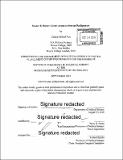Sooner is better : covert action to prevent realignment
Author(s)
Nutt, Cullen Gifford.
Download1144176185-MIT.pdf (17.73Mb)
Alternative title
Covert action to prevent realignment
Other Contributors
Massachusetts Institute of Technology. Department of Political Science.
Advisor
Barry R. Posen.
Terms of use
Metadata
Show full item recordAbstract
Why do states intervene covertly in some places and not others? This is a pressing question for theorists and policymakers because covert action is widespread, costly, and consequential. I argue that states wield it-whether by supporting political parties, arming dissidents, sponsoring coups, or assassinating leaders-when they fear that a target is at risk of shifting its alignment toward the state that the intervener considers most threatening. Covert action is a rational response to the threat of realignment. Interveners correctly recognize a window of opportunity: Owing to its circumscribed nature, covert action is more likely to be effective before realignment than after. This means that acting sooner is better. I test this argument in case studies of covert action decision-making by the United States in Indonesia, Iraq, and Portugal. I then conduct a test of the theory's power in a medium-N analysis of 97 cases of serious consideration of such action by the United States during the Cold War. Interveners, I suggest, do not employ covert action as a result of bias on the part of intelligence agencies. Nor do they use it to add to their power. Rather, states act covertly when they fear international realignment.
Description
Thesis: Ph. D., Massachusetts Institute of Technology, Department of Political Science, 2019 Cataloged from PDF version of thesis. Includes bibliographical references (pages 301-308).
Date issued
2019Department
Massachusetts Institute of Technology. Department of Political SciencePublisher
Massachusetts Institute of Technology
Keywords
Political Science.